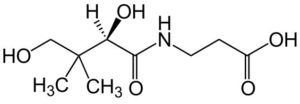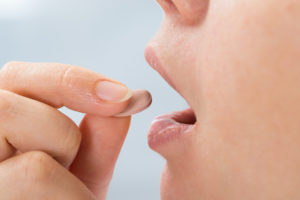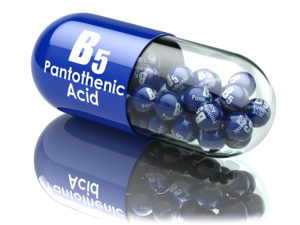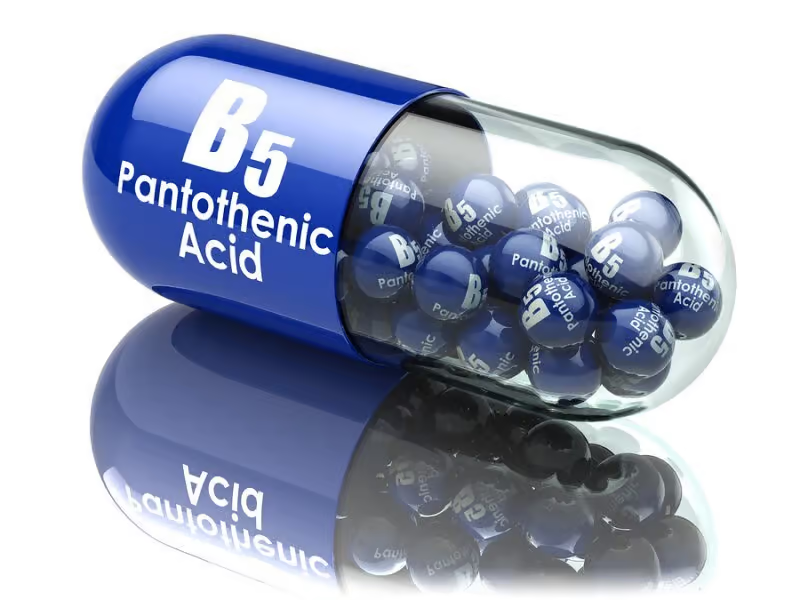Table of Contents
Vitamin B5 (Pantothenic Acid) is one of 8 B-vitamins. B5 is water-soluble and found in every single cell in your body.
Vitamin B5 is essential for the synthesis of acetylcholine (ACh). Adequate levels of ACh can boost focus, memory, learning, and reduce brain fog.
Vitamin B5 is critical for converting nutrients from food into energy, balancing blood sugar, reducing LDL-(bad) cholesterol, lowering blood pressure, preventing nerve damage and pain, and preventing heart failure.
Vitamin B5 plays a part in the synthesis and metabolism of proteins, carbohydrates and fats. Turning them into energy that your brain uses to fire neurotransmitters in your brain.
Vitamin B5 is required for the manufacture of red blood cells, and the stress hormones and sex hormones produced in your adrenal glands.
As a nootropic, Vitamin B5 is crucial for converting the choline in your nootropic stack into acetylcholine (ACh). Without adequate levels of B5 you will not experience the benefits of using precursors to ACh like Alpha GPC and CDP-Choline.
Vitamin B5 (Pantothenic Acid) helps:
- Brain Optimization: Pantothenic acid is at the heart of the KREBs cycle and electron transport chain which helps convert nutrients from food into energy which is used to make adenosine triphosphate (ATP). ATP is the fuel source within each of your cells. More energy increases mental clarity, alertness, memory and mood.
- Neurotransmitters: Pantothenic acid as part of Coenzyme-A (CoA) is involved in the synthesis of the neurotransmitters acetylcholine, epinephrine, and serotonin. Affecting alertness, cognition, memory and mood.
- Mood: Pantothenic acid is often referred to as the “anti-stress vitamin”. Your adrenal glands use CoA (made partly from pantothenic acid) along with cholesterol and Vitamin C to manufacture cortisol and epinephrine. Vitamin B5 has a reputation for reducing stress, anxiety and depression.
Overview
Vitamin B5 (Pantothenic Acid) is one of 8 water-soluble B-vitamins that are absolutely vital to the highly optimized brain. And is essential to all forms of life.

Vitamin B5 is found in every cell in your body including your brain. The name Pantothenic is derived from the Greek word pantothen, meaning “from everywhere”. Reflecting the idea that small amounts of pantothenic acid can be found in nearly every food.
Foods rich in pantothenic acid include animal organs (liver and kidney), fish, shellfish, milk products, eggs, avocados, legumes, mushrooms, and sweet potatoes. Avocados contain the highest amount of pantothenic acid among commonly consumed foods, with one avocado containing about 2 mg.
Pantothenic Acid is a precursor in the biosynthesis of Coenzyme-A (CoA). CoA is an essential enzyme in a variety of chemical reactions that sustain life.
CoA as Acetyl-CoA is required for generating energy from fat, carbohydrates and proteins. This energy in the form of glucose is the fuel source for each cell.
Acetyl-CoA is also involved in the citric acid cycle (KREBs), in the synthesis of essential fats, cholesterol, steroid hormones, vitamins A and D, and the neurotransmitters acetylcholine (ACh) and serotonin.
Coenzyme A derivatives are also required for the synthesis of melatonin which controls your circadian rhythm and sleep/awake cycle. And for the metabolism of drugs and toxins in your liver.
How does Vitamin B5 (Pantothenic Acid) work in the Brain?
Vitamin B5 (Pantothenic Acid) boosts brain health and function in several ways. But two in particular stand out.
- Vitamin B5 increases energy. Pantothenic acid is an essential coenzyme involved in mitochondrial aerobic respiration. Vitamin B5’s role in the citric acid cycle (KREBs) and electron transport chain helps convert nutrients from food into energy which is used to make adenosine triphosphate (ATP). ATP is the fuel source within each of your cells.
Pantothenic acid takes part in the synthesis of Acetyl-CoA which is at the heart of the KREBs cycle. Acetyl-CoA in your brain is also involved in the synthesis of cholesterol, amino acids, phospholipids, and fatty acids.
CoA is also involved in the synthesis of the neurotransmitters acetylcholine and serotonin, and steroid hormones. User reviews of those supplementing with pantothenic acid claim to having more energy. This boost in energy comes from this long series of events stemming from supplementing with pantothenic acid.[i]
- Vitamin B5 helps reduces stress. Pantothenic acid is often referred to as the “anti-stress vitamin”. Your adrenal glands use CoA (made partly from pantothenic acid) along with cholesterol and Vitamin C to manufacture cortisol and epinephrine.
When cortisol levels are low, your stress related hormones are compromised as is your ability to cope and respond to stress. And if your cortisol levels are abnormally high (a common problem), your body’s reserve of Pantethine (the active form of pantothenic acid) needs to be replenished in order to sustain good adrenal function.[ii]
Vitamin B5 has a reputation for reducing stress, anxiety and depression.
How things go bad
Chronic stress, anxiety and lower acetylcholine levels can damage your brain. This damage can manifest in several ways including memory loss, brain fog, anxiety, depression, and even neurodegenerative diseases like Alzheimer’s and Parkinson’s.
↓ Acetylcholine synthesis declines
↓ Concentration, memory, learning, and recall decline
↑ LDL-cholesterol (bad) and triglycerides increase
↓ HDL-cholesterol (good) levels decline
↓ Wound healing takes longer
↓ Energy levels decline
↑ Numbness, tingling, burning sensations, shooting pain in the feet increase
Vitamin B5 supplementation can help increase acetylcholine, epinephrine and serotonin levels in your brain. And help modulate cortisol levels produced in your adrenal glands. Helping you to cope with stress and lessen depression, and less adrenal fatigue.
Vitamin B5 (Pantothenic Acid) Benefits
When you take Vitamin B5 as a supplement, it is converted to Pantethine. Pantethine is a more stable disulfide (double bonded) form of pantothenic acid.
It is this active form of pantothenic acid that is converted into the enzyme Coenzyme-A (CoA). CoA plays a critical role in the metabolism and breakdown of the three essential micronutrients: proteins, carbohydrates and fats.
CoA is a cofactor in more than 70 enzymatic pathways including:
- Amino acid catabolism
- Acetylcholine synthesis
- Carbohydrate metabolism
- Fatty acid oxidation
- Heme synthesis
- Pyruvate degradation
- Phase II detox acetylation
CoA is also involved in the initial steps of cholesterol synthesis and all the downstream metabolites of cholesterol including steroids, Vitamin D, and bile acids.
CoA helps break down the carbon skeleton of amino acids which are metabolized to pyruvate and enter the KREBs cycle. This cycle is crucial to ATP synthesis within your mitochondria.
CoA directs acetyl groups to form ubiquinone (CoQ10), squalene and cholesterol. You also need CoA for the transport of long chain fatty acids into mitochondria where fats are converted into energy.
The bottom-line is CoA is behind the production of hemoglobin, bile, sex and adrenal hormones (steroids), cholesterol and the neurotransmitters acetylcholine and serotonin in your brain.
How does Vitamin B5 (Pantothenic Acid) feel?
Vitamin B5 is water-soluble, and has been shown to improve mood, energy and cognition.
Neurohackers who supplement with pantothenic acid report being wonderfully optimistic, energetic and mentally sharp.
People report Vitamin B5 helps them focus better, they feel a profound increase in energy and concentration improves.
Many people dealing with acne find they have healthier looking skin. Acne is cleared within a few days to a few weeks of supplementing with pantothenic acid.
Men and women find that supplementing with Vitamin B5 helps prevent hair loss. And if taken early enough may even help avoid hair turning prematurely gray.
Some neurohackers report that pantothenic acid helps improve vision and hearing.
Vitamin B5 Clinical Research
Vitamin B5 (Pantothenic Acid) reduces Acne
100 people of Chinese descent (45 males and 55 females) aged 10 – 30 years with severe acne were treated with high-dose pantothenic acid. A total of 10 grams per day were given in 4 divided doses.
Participants were also asked to apply a cream to affected areas 4 – 6 times per day. The cream contained 20% pantothenic acid.
Their face became noticeably less oily within 3 days of starting therapy. Within 2 weeks, facial pore size became smaller and acne lesions began to heal. And the rate of new acne eruptions had slowed.
By 8 weeks, acne was usually controlled. Most acne lesions were gone and new eruptions occurred only occasionally. The participants with severe acne required 6 months of treatment to control acne.
The author of the study noted that in some of the severe cases, daily doses of 15 – 20 grams of pantothenic acid would produce a faster response. 35 patients were monitored for 18 months; the maintenance dose needed to control acne ranged from 1 – 5 grams per day of pantothenic acid.[iii]
Vitamin B5 (Pantethine) to decrease LDL-Cholesterol
User reviews consistently show success with lowering LDL-cholesterol and triglycerides, and raising HDL-cholesterol by supplementing with Vitamin B5 (Pantethine).
The National University of Health Sciences in Illinois conducted an evaluation of clinical trials from 1966 to 2002 for studies using the Pantethine version of Vitamin B5 to improve cholesterol.
28 clinical trials with a pooled population of 646 ‘hyperlipidemic’ subjects were evaluated. Mean age of participants were 52.8 years. Average study length was 12.7 weeks with an average dosage of 900 mg per day of Pantethine.
The mean decrease of LDL-cholesterol (bad cholesterol) was 10 – 20%. The mean decrease of triglycerides was 14 – 33%. And the mean increase of HDL-cholesterol (good cholesterol) was 4 – 11%.
The researchers concluded that “pantothenic acid was an effective therapeutic option in treating patient populations with total serum cholesterol levels greater than 200 mg/dL, and/or serum triacylglycerol levels greater than 150 mg/dL.”
The team noted that the full benefit of Pantethine may not be attained until at least 4 months from beginning supplementation. And that Pantethine is a well-tolerated therapeutic agent that deserves much more attention than it has recently received.[iv]
Vitamin B5 (Pantothenic Acid) increases Longevity
Vitamin B5 is believed to extend life span. But research in humans for obvious reasons has been difficult. Humans live longer than most mammals. And tracking human subjects for life would be prohibitively expensive.
So animal research is the next best thing. A team in Austin gave 33 young male and female mice 300 μg of calcium pantothenate daily in drinking water. Forty-one control mice did not receive the vitamin supplement.
The mean life span for mice who received calcium pantothenate was 653.1 days. And for the control mice life span was 549.8 days. The mice using Vitamin B5 lived 19% longer.[v]
Royal jelly has long been used as a longevity supplement. And some of the science backs this up. Pantothenic acid is the primary anti-aging factor isolated from royal jelly.
The combination of pyridoxine, biotin and sodium yeast nucleate extended the lifespan of the common fruit fly. And the addition of pantothenic acid further increased life span.[vi]
Seems that supplementing with pantothenic acid (Vitamin B5) will help you live longer.
Vitamin B5 Recommended Dosage
If you are using an acetylcholine (ACh) precursor like Alpha GPC or CDP-Choline in your nootropic stack, you should be using Vitamin B5. Because B5 is needed to make Coenzyme-A (CoA). CoA and choline are needed to synthesize acetylcholine.
The recommended dosage of Vitamin B5 (Pantothenic Acid) is a one-to-two ratio with a choline supplement. For example, 250 mg of Vitamin B5 with 500 mg of CDP-Choline.
If you don’t get enough Vitamin B5, you may not notice significant improvements when supplementing with your preferred choline source. If you’ve added choline to your racetam stack and still get a “choline headache” it’s likely because you don’t have adequate Vitamin B5 in your system.
Pantothenic Acid or Pantethine is generally well tolerated in doses up to 1,200 mg/day. Some neurohackers report doses above 1,000 mg can induce gastrointestinal side effects like nausea or heartburn.
Oral contraceptives (birth control pills) containing estrogen and progestin may increase the requirement for additional pantothenic acid.
Use of Pantothenic Acid in combination with cholesterol-lowering drugs (statins) or with Vitamin B3 (niacin or nicotinic acid) may produce additive effects on blood lipids. So be careful because you could lower LDL-cholesterol to unhealthy levels.
Vitamin B5 Side Effects
Vitamin B5 (Pantothenic Acid) is non-toxic. So is considered well-tolerated and safe.
Side effects are rare but very high doses can include stomach upset, nausea or diarrhea.
If you are taking the antibiotic tetracycline, you should avoid using extra Vitamin B5 because it could negate the effects of tetracycline.
If you are on drugs called cholinesterase inhibitors used for treating Alzheimer’s, you should not be using Vitamin B5.
Type of Vitamin B5 to buy
When choosing a Vitamin B5 supplement, your basic choice is between Pantethine or Pantothenic Acid.
Pantethine is by far the more active choice when it comes to producing CoA. And this is backed up by many clinical trials. Researchers have pointed out that Pantethine creates twice as much CoA compared to Pantothenic Acid.
However, Pantothenic acid does have its benefits. It enhances adrenal function and modulates inflammation. If you can, find a supplement that combines both.
Vitamin B5 supplement labels will show pantothenic acid as “Calcium” or “sodium D-pantothenate” which is used for treating stress, migraines and allergies.
Pantethine is mainly recommended for lowering blood cholesterol levels. And Pantethine is better for stacking with a choline supplement because it creates more CoA than other pantothenic acid derivatives.
Pantothenol (panthenol) is a stable alcohol analog of Vitamin B5 (pantothenic acid), which can be rapidly converted to pantothenic acid by humans.
Most multivitamins also include some form of Vitamin B5 (Pantothenic Acid) in their formula. But many of these multis don’t contain enough for optimum health. And many have an inferior isolated or synthetic version of the nutrient.
The Performance Lab® NutriGenesis Multi offers a nature-identical form of Vitamin B5 (Pantothenic Acid) and is now my favorite daily multivitamin/mineral supplement.
I prefer the Performance Lab® multi because it’s more potent, it’s biologically active and I’ve found to be a far more effective multi compared to every other multivitamin supplement I’ve ever used.
Performance Lab® uses their own priority NutriGenesis® vitamins and minerals which are grown on probiotic, plant and yeast cultures in a state-of-the-art lab.
Nootropics Expert Recommendation
Vitamin B5 (Pantothenic Acid) up to 1,000 mg per day
 I recommend using Vitamin B5 as a nootropic supplement.
I recommend using Vitamin B5 as a nootropic supplement.
Your body does not make Vitamin B5 on its own. So to get its benefits you must get it from food, or take it as a supplement.
Vitamin B5 is especially helpful for those suffering from low energy levels, anxiety, depression, and chronic pain.
Experience shows Vitamin B5 helps stop and reverse the symptoms associated with high cholesterol levels. B5 will lower ‘bad’ LDL-cholesterol and triglycerides as well as raise ‘good” HDL-cholesterol.
Vitamin B5 is also particularly helpful to students and executives who want to boost cognition, learning and memory. Because it raises acetylcholine levels in your brain.
Vitamin B5 can produce a noticeable increase in mental clarity. And give you a significant energy boost physically and mentally. You’ll feel more awake and alert. Without the side effects you’d get from stimulants like caffeine.
Vitamin B5 is a must have addition for any nootropic stack. If you are using any of the racetams like Piracetam and Aniracetam and are using a choline supplement to raise acetylcholine levels, you absolutely need extra pantothenic acid.
The recommended dosage of Vitamin B5 (Pantothenic Acid) is a one-to-two ratio with a choline supplement. For example, 250 mg of Vitamin B5 with 500 mg of CDP-Choline.
At the very minimum every neurohacker should be using a multivitamin every day that includes Vitamin B5 (Pantothenic Acid). The best multi I’ve found and use every day is the Performance Lab® NutriGenesis Multi for men or women.









Join The Discussion - 61 comments
Lester Mills
June 17, 2025
There’s a human clinical trial using vitamins and measured amyloid beta plaques with PET Scan (Korea, 2018) that conclusion increase plaques amyloid beta especially pantothenic acid….
https://pmc.ncbi.nlm.nih.gov/articles/PMC6294831/
This clinical trial…doesn’t make sense of me….if…Vit B5 helps build in your brain acetylcholine…and B5 essential for Coenzyme A.
David do think…if this trial is valid?
David Tomen
June 23, 2025
Lester, that finding was only in those with Aβ-positive blood type. And this comparison was between Aβ-positive and Aβ-negative. Are you either of those blood types?
Lester Mills
June 26, 2025
My blood is common O+…then…I happy this clinical trial…not valid for me
Megan Ward
May 23, 2025
I have looked so much…I can’t find any supplements combining Pantethene and Pantothenic Acid. Do you know of any specifically? I’m primarily looking for the adrenal (calming, stress reducing) effect. Thank you!
David Tomen
May 25, 2025
Megan, try this one: https://geni.us/PfSDxfs
Megan Ward
May 28, 2025
Ok, thank you for the suggestion. And does that version, the pantethine, provide noticeable help with anxiety/stress as well as the CoA support?
David Tomen
May 28, 2025
Megan, the only way to find out if it will help is to try it. I can only report what some others have said about their experience with this supplement. But not everyone will feel the same benefit. Experimenting is the only way.
David Broedersz
January 14, 2024
Dear David,
Thanks for sharing all this valuable info on B5. My question on B5 is why is it possible to have a wired/hyper feeling after taking 200mg when having a calm feeling after taking 400mg af B5. And when it comes down to calming you down would you say Pantethine or Pantothenic acid would be a first choice? Thanks!
David Tomen
January 14, 2024
David, you need both because Pantethine is needed to produce CoA for a variety of things including energy production, and acetylcholine and serotonin production. And you need Pantothenic Acid for adrenal support which helps you manage stress.
Kelly
May 27, 2024
Isn’t this backwards? At least according to the Linus Pauling Institute and many other sources, it’s pantothenic acid that’s the precursor for Coenzyme-A, which is essential for energy production via the citric acid (Kreb’s) cycle, while pantethine is used to lower blood lipids.
???
Kelly
David Tomen
June 3, 2024
Kelly, when taken as a supplement Pantethine has been shown to increase Co-A but not Pantothenic Acid: https://pubmed.ncbi.nlm.nih.gov/3689482/
salem
January 7, 2024
hi david
if someone has a high cortisol or adrenaline level, will taking b5 increase the cortisol even more and worsen it ? as b5 support the adrenal
last question, are b1 and b5 both are part of synthesis of acetylcholine ?
thanks
David Tomen
January 8, 2024
Yes to your last question. But I highly recommend using a bioactive B-Complex rather than individual B-Vitamins. Because you need all of them, are likely low in most of them, and they work in synergy.
To reduce cortisol you can L-Theanine, Phosphatidylserine, Ashwagandha, Polygala Tenuifolia, and magnesium to start. If that’s not enough then let me know. 🙂
Randy B.
January 21, 2023
Hi,
I would like to take a vitamin B5 supplement but the doses are so far above the Daily Value of 5mg that is makes me think twice. Why do supplements contain 100mg 2,000%, 250mg 5,000% and even 500mg 10,000% of the recommended daily amount of 5mg in each capsule when the absorption of vitamin B5 is very good?
Thank you very much.
Randy B.
David Tomen
January 25, 2023
Randy, the RDA have been determined by the geniuses at the FDA to keep you from dying. If you want to thrive I humbly suggest you pay attention to those of us who have studied the science and know how much our body and brain requires of each of these nutrients to thrive. Not just survive.
Rose77777
September 19, 2022
This article explains so much about the benefits of vitamin B5 (pantothenic acid) supplementation. Thanks! I recently started taking it, thanks to reading some information on this vitamin which struck me as relevant to my health issues. Boy was I ever right!
Ever since training intensively in martial arts, I have been plagued by chronic stress issues and related problems like anxiety/fear and panic attacks, sleep issues and insomnia episodes, intestinal disturbances, skin issues, hair loss, anemia and chronically numb feet. That training was super intensive and instructors seemed focused on stressing us out to the max in every way, so my theory is this somehow created a deficiency of this “AntiStress Vitamin” which never got resolved. (I have my theories on this, but they would take too long to explain….)
The proof is in the pudding, as they say, and my proof is in the improvement across-the-board of these and so many other little symtoms. Best of all, I feel so much calmer and more relaxed. I don’t feed so much into fear and anxiety and so am enjoying life so much more now! And, when things go wrong, I am much less reactive and so a much more pleasant person to be around.
So, thanks for giving so much information here. It helps me understand better what this nutrient does in the body and so helps me understand why it is so key to my health.
FYI– there are different reasons deficiencies might develop of Vit B5: Genetic damage or genes; malnourishment such as happens in developing countries, from poor diets or malabsorption issues, or drinking too much alcohol; and also the malaria parasite using its hosts stores of pantothenic acid for its own growth.
James
July 15, 2022
Hey Dave,
Just wanted to ask a quick question about this part:
“The recommended dosage of Vitamin B5 (Pantothenic Acid) is a one-to-two ratio with a choline supplement. For example, 250 mg of Vitamin B5 with 500 mg of CDP-Choline.”
I have Alpha GPC instead of CDP-Choline, would the 1:2 ratio remain the same for Vitamin B5: Alpha GPC? e.g. 250 mg of Vitamin B5 with 500 mg of Alpha GPC?
Thanks 🙂
David Tomen
July 17, 2022
James, it would be the same ratio but it really depends on if you are getting the benefit of Alpha GPC already. If you do not think you are then use that ratio.
Michael
February 11, 2022
Hi David!
My methyl B complex contain:
B1: 100mg
B2: 40mg
B3: 16mg
B5: 150mg
B6: 18mg
B7: 2500ug
B9: 600ug
B12: 100ug
Can I double this dose per day and use 2 capsules? Should I feel more energized?
I also take 500mg Niacinamide and 400mg Sulbutiamine once per day, but my question refers specifically to b complex described above.
Thank you for your work Sir!
David Tomen
February 11, 2022
Michael, you can double it but no idea if you will make you feel more energized. That depends on your system and how you react to it.